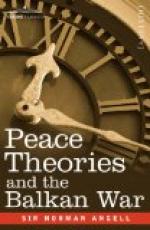I may say, in passing, that I am not clear that even on the question thus raised Mr. Angell makes out his case. His case, broadly stated, is that the net of “Finance”—or, to put it plainer, Cosmopolitan Usury—which is at present spread over Europe would be disastrously torn by any considerable war; and that in consequence it is to the interest of the usurers to preserve peace. But here, it seems to me, we must make a clear differentiation. It may easily be to the interest of a particular usurer, or group of usurers, to provoke war; that very financial crisis which Mr. Angell anticipates may quite probably be a source of profit to them. That it would not be to the interest of a nation of usurers to fight is very probable. That such a nation would not fight, or, if it did, would be exceedingly badly beaten, is certain. But that only serves to raise the further question of whether it is to the ultimate advantage of a nation to repose upon usury; and whether the breaking of the net of usury which at present unquestionably holds Europe in captivity would not be for the advantage, as it would clearly be for the honour, of our race.... The sword is too sacred a thing to be prostituted to such dirty purposes. But whether he succeeds or fails in this attempt, it will make no difference to the mass of plain men who, when they fight and risk their lives, do not do so in the expectation of obtaining a certain interest on their capital, but for quite other reasons.
Mr. Angell’s latest appeal comes, I think, at an unfortunate moment. It is not merely that the Balkan States have refused to be convinced by Mr. Angell as to their chances of commercial profit from the war. It is that if Mr. Angell had succeeded to the fullest extent in convincing them that there was not a quarter per cent. to be made out of the war, nay, that—horrible thought!—they would actually be poorer at the end of the war than at the beginning, they would have gone to war all the same.
Since Mr. Angell’s argument clearly applies as much or more to civil as to international conflicts, I may perhaps be allowed to turn to civil conflicts to make clear my meaning. In this country during the last three centuries one solid thing has been done. The power of Parliament was pitted in battle against the power of the Crown, and won. As a result, for good or evil, Parliament really is stronger than the Crown to-day. The power of the mass of the people to control Parliament has been given as far as mere legislation could give it. We all know that it is a sham. And if you ask what it is that makes the difference of reality between the two cases, it is this: that men killed and were killed for the one thing and not for the other.
I have no space to develop all that I should like to say about the indirect effects of war. All I will say is this, that men do judge, and always will judge, things by the ultimate




